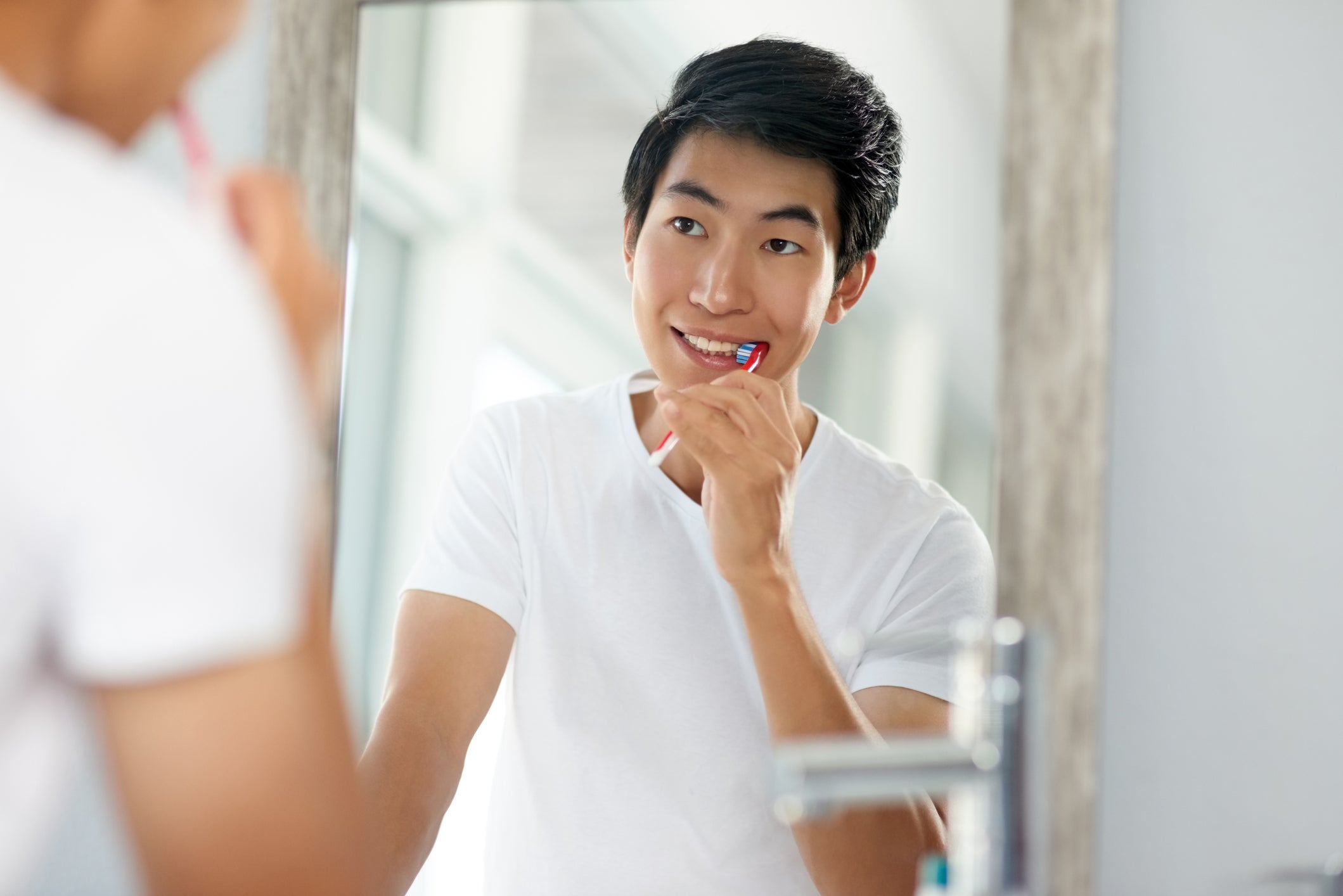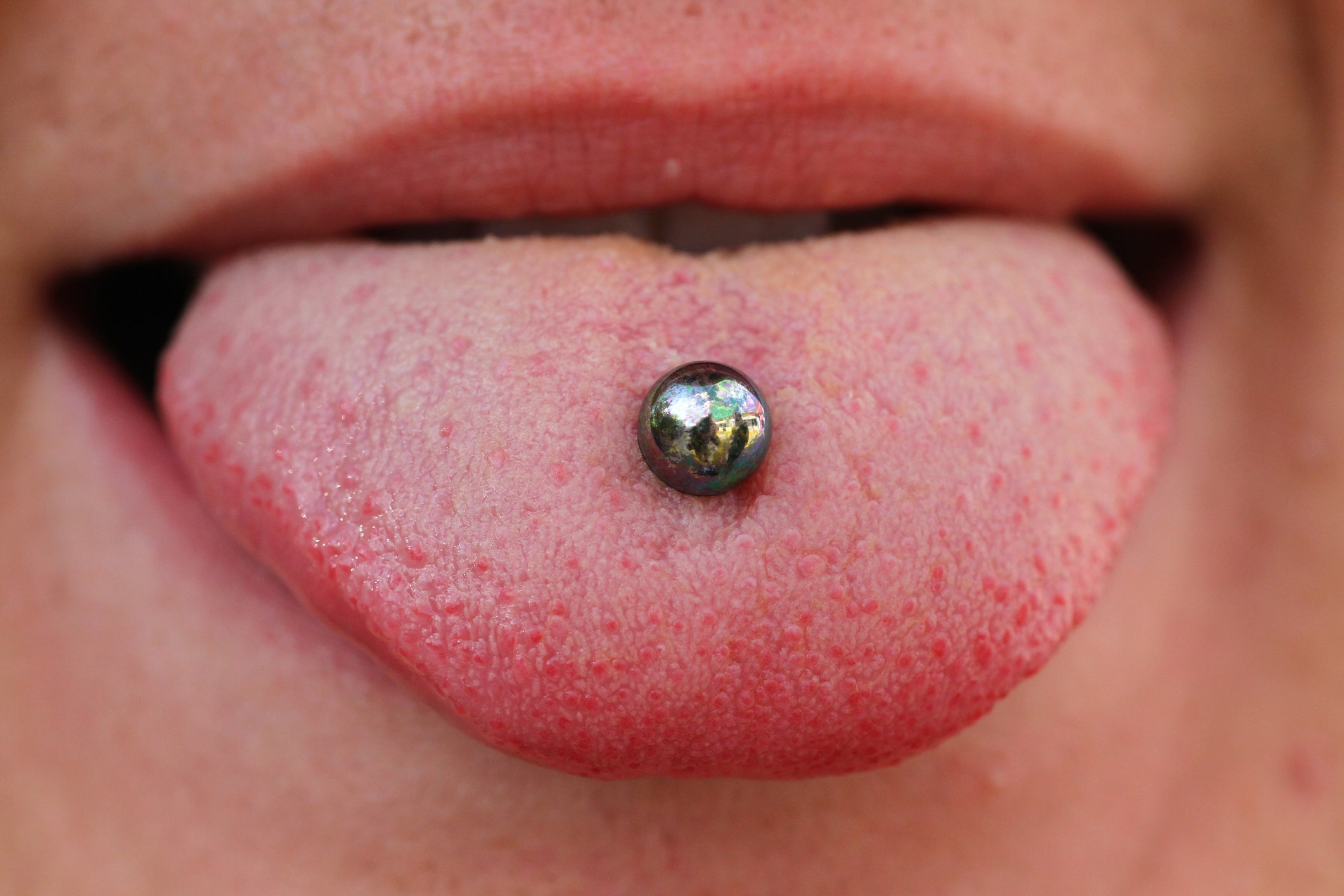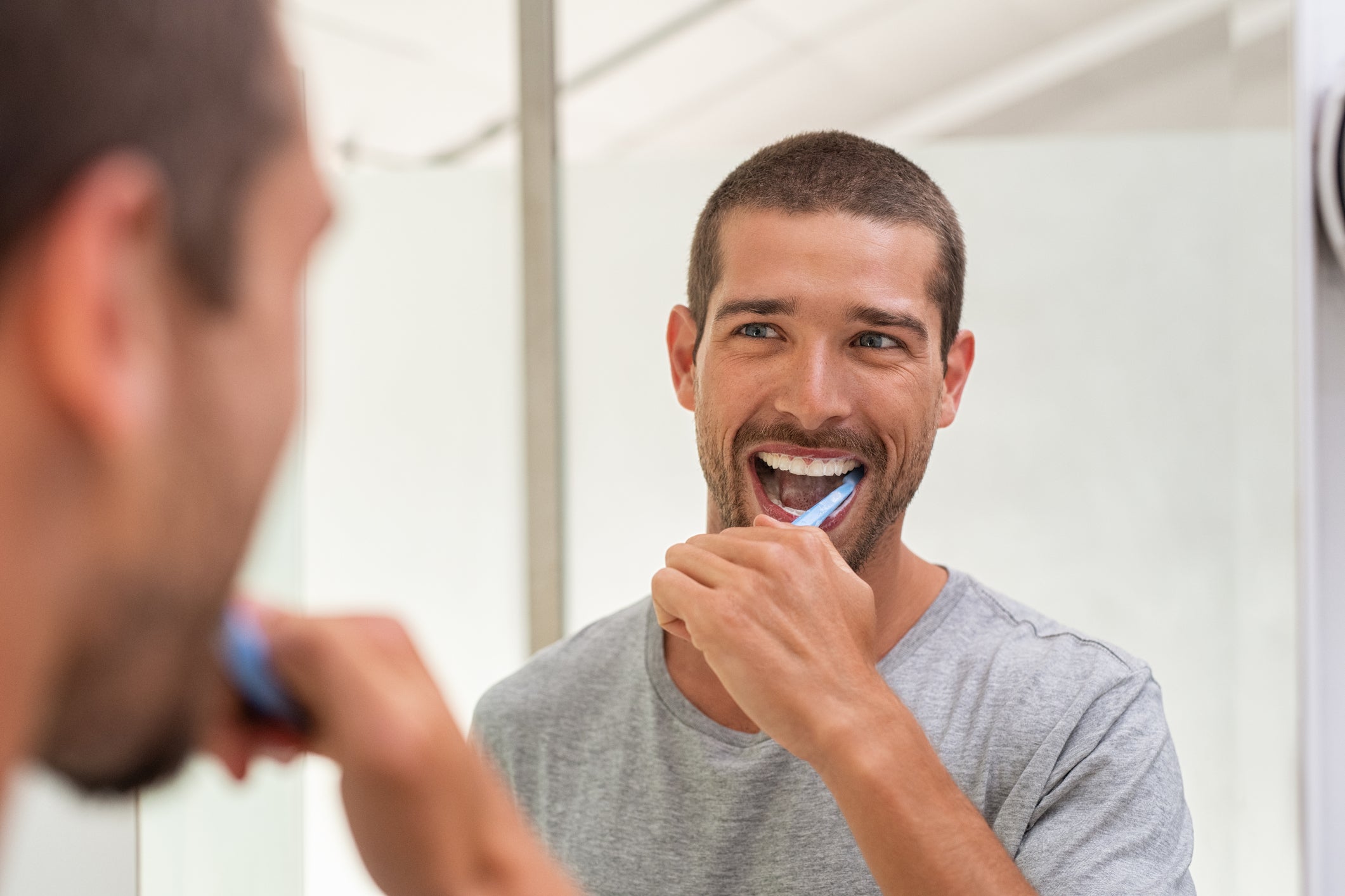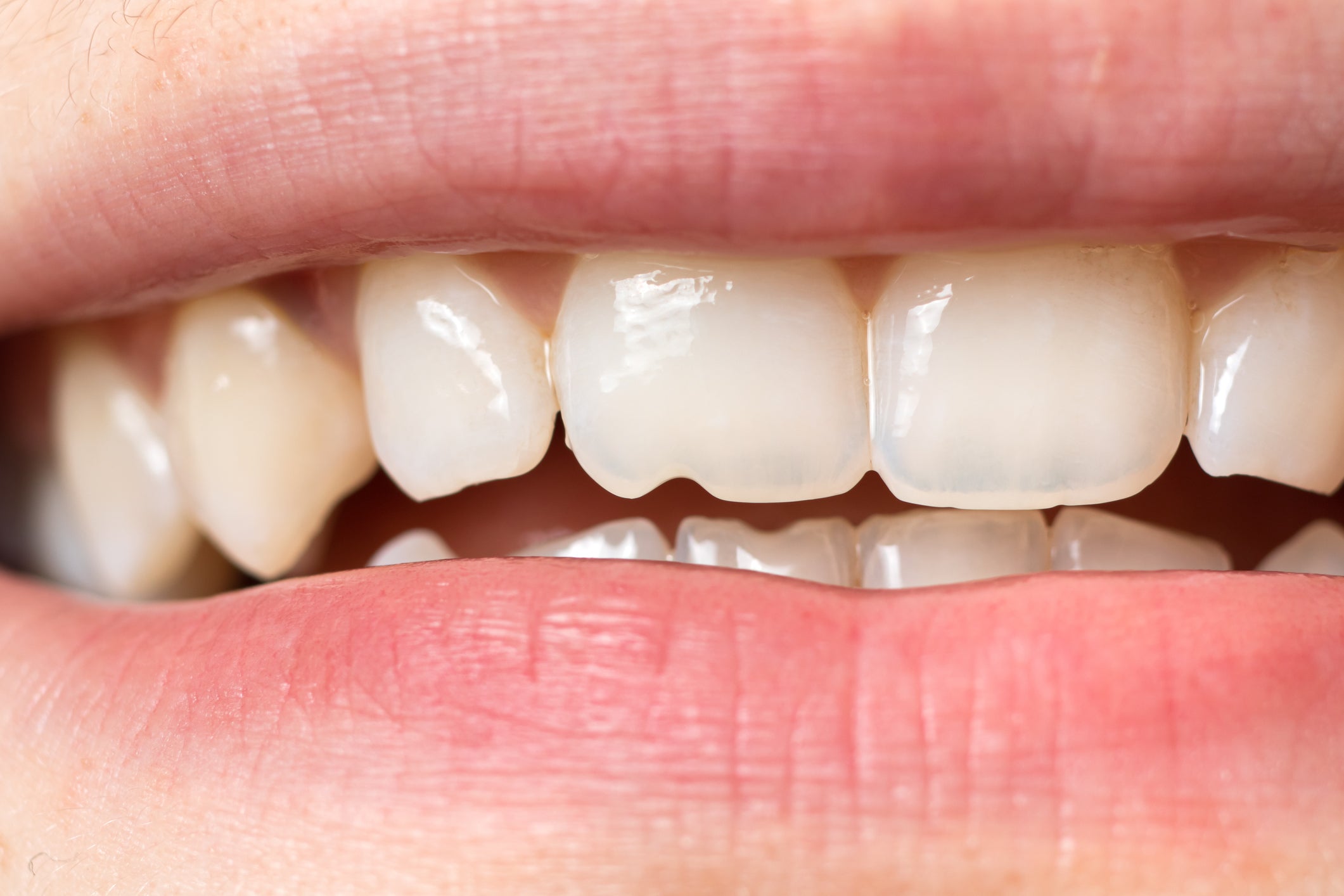-
Do Whitening Toothpastes Actually Work?

Could your teeth stand to be whiter? Most people would answer yes, which is why there are so many whitening toothpastes on the market. But do these toothpastes actually work? Read on to learn more about whitening toothpastes and additional treatments you might want to consider.
What do whitening toothpastes actually do? They work, using special abrasives and peroxide or other chemicals, to polish the teeth and dissolve stains. If you’ve got noticeable stains from things like coffee, cigarettes, or soda, whitening toothpaste will remove these stains and make a difference in the look of your teeth. Some whitening toothpastes use a chemical called blue covarine, which creates an optical illusion by adhering to the surface of the teeth and making them appear less yellow. It’s important to note, though, that whitening toothpastes can’t lighten stains under the surface of a tooth or change the tooth’s natural color.
Another fact to keep in mind is that the results of whitening toothpaste aren’t immediate. You’ll need to use your whitening toothpaste twice a day for two to six weeks in order to have teeth that look whiter. If you decide to go this route, make sure you’re using a brand of toothpaste that has the American Dental Association Seal of Acceptance or a similar endorsement from a reputable organization. Remember, though, that whitening toothpastes use abrasives, which can wear down the enamel as they’re removing stains.
Whitening toothpastes are not the only at-home options for tooth whitening. An over-the-counter tooth bleaching product or kit is a more effective option for lightening your teeth than toothpaste. These bleaches must stay in contact with the teeth for a longer time than toothpaste, and you’ll have to use this type of product regularly for two to four weeks.
Professional whitening is a much more effective alternative to anything you can do at home. One great option is Zoom!®, a whitening treatment that takes only an hour and whitens your teeth significantly. In fact, most people achieve about eight shades of whitening in the Zoom! process. After examining your teeth and gums to make sure they’re healthy, the dentist will cover your lops and gums with material to protect them while your teeth are being treated. The whitening gel is applied and activated by the Zoom! light source to gently break up stains and whiten your teeth. You’ll receive three 15-minute applications within the one hour treatment time, then you’ll rinse, and your treatment will be complete. It’s easy and painless, and the results are immediate.
If you’re looking for Zoom!® teeth whitening, we provide that and much more at the practice that was voted best dentist in NYC. At Park 56 Dental Group, we offer pediatric, prosthodontics, endodontics, oral surgery, Invisalign®, emergency, and sedation dentistry, all at the highest level of treatment. We serve the Midtown, Central Park, Upper East Side, Park Avenue, and all surrounding Manhattan and New York areas, with a patient-centered practice that has hours to fit your schedule. Schedule your complimentary consultation today by contacting us online or calling us at (212) 826-2322.
-
Signs it’s Time to Switch to a New Dentist

Change can be difficult, but sometimes it’s necessary. Is it time for you to change dentists? It can be a hard decision to make, especially if you’ve been with your dentist for a long time. Still, there are some clear signs that it’s time to move on.
- Maybe your needs have outgrown your dentist. If you’ve been going to a pediatric dentist and you’re now an adult, it’s definitely time for you to move along. If you have children, it’s smart to choose a dentist who offers both pediatric and adult dentistry.
- It could be that someone has moved. Maybe it’s you, or maybe it’s your dentist. Whether your favorite dentist has moved away from the practice, or you’ve relocated to a new town, a change in location can warrant a change of dentist. It’s important that the dentist you trust is in a location that’s convenient for you.
- Sometimes, your dentist won’t take your insurance. They may have changed their policies, or your may have switched providers. If your dental office is no longer in-network for your insurance plan, it’s time to switch.
- You might have noticed some red flags. If your dentist pressures you to use their practice for services for which you should consult a specialist, if the environment has changed to something that doesn’t feel hygienic or safe, or if you feel uncomfortable with the dentist or staff, move on. If you’re constantly having to dispute billing or the dentist discourages you from seeking a second opinion, those are also reasons to switch.
- If you’re not happy, that’s reason enough. If the dental practice you’re using is no longer meeting your needs, you have the right to find one that will. Whether it’s a lack of services provided, poor customer service, or another reason, look for a dentist where you’ll be happy.
Once you’ve decided to switch, what’s the next step? Do some research and find a practice that will be the right fit for you and your family. Look at the services offered, check out reviews, and research the dentist’s background and certifications. Beyond that, read up on the practice to determine their values, philosophy, and level of technology. Once you’ve done this, visit the office to see if it lives up to your expectations and meets your needs.
At Park 56 Dental Group, we are committed to meeting each patient’s specific needs. We’ve been providing top-quality care and treating each patient individually since 1997, making it comfortable and easy to visit the dentist. We accept many different insurance plans and welcome you to visit us so that you can make an educated decision about your dental care.
If you’re looking for the perfect dentist, choose the practice that was voted best dentist in NYC! At Park 56 Dental Group, we offer pediatric, prosthodontics, endodontics, oral surgery, Invisalign®, emergency, and sedation dentistry, all at the highest level of treatment. We serve the Midtown, Central Park, Upper East Side, Park Avenue, and all surrounding Manhattan and New York areas, with a patient-centered practice that has hours to fit your schedule. Schedule your complimentary consultation today by contacting us online or calling us at (212) 826-2322.
-
How Oral Piercings Can Affect Your Dental Health

Piercings are growing ever more popular, and many people choose to express their individuality with an oral piercing. Unfortunately, cheek, tongue, and lip piercings often come with complications that can have an impact on your dental health. Before you get an oral piercing, make sure you know the risks.
Any piercing can cause an allergic reaction. You might experience pain and swelling after the procedure, or develop a skin infection that causes redness and pain or even scarring. When jewelry is accidentally ripped out, it can cause tearing and trauma, and piercings come with a risk of bloodborne diseases like Hepatitis B, Hepatitis C, and HIV. While those complications apply to all piercings, though, there are some problems that specifically occur with oral piercings. According to the American Dental Association, complications that can result from oral piercings include:
- Chipped or cracked teeth or a swollen tongue: The piercing can bump against your teeth while you talk or eat. You might even find that you sometimes bite it. When this happens, the piercing can injure your gums or crack or scratch your teeth. Your teeth may become sensitive, or you might damage your fillings. In addition, jewelry in your mouth can accumulate plaque, leading to tooth decay and cavities.
- Halitosis: It’s hard to properly clean your mouth when there’s jewelry covering part of your oral tissue. This leads to plaque bacteria and food debris building up in your mouth and causing bad breath.
- Bacterial infections: Your mouth is already a welcoming place for bacteria, because it’s so moist. Add in an incision and jewelry, and the bacteria trapped around your piercing can lead to infection, with symptoms of redness, swelling, pain, and a foul odor.
- Increased saliva: Usually, you want a good flow of saliva to wash out your mouth and prevent tooth decay. However, the excessive saliva flow that can be caused by an oral piercing can lead to the development of tartar, calcified plaque. Tartar hardens on teeth and under gums, and removing it requires a professional dental cleaning.
- Gum issues: Metal rubbing against the gums when you’re chewing, speaking, or just moving the piercing can cause gums to recede, which sometimes requires surgical correction. Piercings also raise the risk of gum disease, which can negatively impact your health and lead to tooth loss.
- Problems with dental care: Jewelry in your mouth makes it harder for your dental team to care for your oral health. It can even interfere with x rays and other diagnostic tools.
- Tissue trauma: Sometimes piercing jewelry becomes infected and must be surgically removed. You can also form scar tissue that may become large and require surgical removal.
- Changes in speech: Oral piercings can cause you to speak differently and impede your normal chewing.
- Obstructed airway: If the piercing becomes infected, you may experience breathing problems. Worse, if a piercing dislodges when you’re sleeping, speaking, or chewing, it can become lodged in the back of the throat, causing choking or airway obstruction.
- Nerve damage: After a piercing, your tongue may feel numb because of temporary nerve damage. Sometimes, though, this damage becomes permanent. This can affect your sense of taste and the movement of your mouth.
You might not realize it, but these complications are surprisingly common. While they don’t happen to everyone with oral piercings, they happen frequently enough and cause enough serious damage to be of concern. You can reduce your risk of complications, however, by being vigilant about caring for your mouth. Brush twice a day, floss, and use an alcohol-free mouthwash. Don’t play with your jewelry, stay vigilant for signs of infection, and periodically check to make sure it’s tightly secured.
If you’re looking for the perfect dentist, choose the practice that was voted best dentist in NYC! At Park 56 Dental Group, we offer pediatric, prosthodontics, endodontics, oral surgery, Invisalign®, emergency, and sedation dentistry, all at the highest level of treatment. We serve the Midtown, Central Park, Upper East Side, Park Avenue, and all surrounding Manhattan and New York areas, with a patient-centered practice that has hours to fit your schedule. Schedule your complimentary consultation today by contacting us online or calling us at (212) 826-2322.
-
How to Avoid Wearing Dentures in the Future

Growing older means facing a variety of challenges. Some of the difficulties that come along with aging are inevitable, but wearing dentures is not one of those things. There are steps you can take to be proactive with your dental care so that you won’t have to wear dentures in the future.
- First, brush your teeth. It may seem to simple and obvious to need to be stated, but many people to not properly clean their teeth. Did you know that over 20 million people in the United States are missing all of their natural teeth? That’s a lot of people who need dentures. Some of that tooth loss stems from poor brushing habits, because one in four adults in this country doesn’t brush twice daily. Lack of brushing leads to periodontal disease, which the National Institute of Dental and Craniofacial Research cites as the most common cause of tooth loss among adults. Brush your teeth twice a day, with a good toothbrush and fluoride toothpaste certified by the ADA.
- While you’re at it, floss! Flossing is important, because when tiny food particles are allowed to remain between your gums and teeth, they harden and turn into tartar. Tartar is often the cause of gingivitis which leads to periodontitis, which leads to lost teeth. Lost teeth, of course, lead to dentures. Floss at least once a day and consider augmenting your brushing and flossing routine by rinsing with a dentist-approved mouthwash.
- Schedule regular dental checkups. It is recommended that adults visit the dentist for a cleaning and exam every six months. Unfortunately, only about half of adults in the U.S. actually do that. These appointments are very important, though, for many reasons. When you have regular cleanings, the dentist and hygienist can help you keep tooth decay and gum disease at bay. Further, when your dentist examines your teeth every six months, there’s a better chance of catching any problems when they’re small, before they grow into major issues.
Of course, if you do end up needing dentures, it’s not the end of the world. Today’s dentures are much better than the dentures of generations past, and if you’re replacing missing teeth, you may even be able to get implants as well, provided you don’t have bone deterioration. If you have pain, bleeding gums, you’re losing your teeth, or you are having trouble eating, don’t suffer in silence. Instead, find a good dentist who can help you determine your best options.
If you’re looking for the perfect dentist, choose the practice that was voted best dentist in NYC! At Park 56 Dental Group, we offer pediatric, prosthodontics, endodontics, oral surgery, Invisalign®, emergency, and sedation dentistry, all at the highest level of treatment. We serve the Midtown, Central Park, Upper East Side, Park Avenue, and all surrounding Manhattan and New York areas, with a patient-centered practice that has hours to fit your schedule. Schedule your complimentary consultation today by contacting us online or calling us at (212) 826-2322.
-
How to Care for Sensitive Teeth

Do you experience pain after consuming hot or cold foods and beverages? The Academy of General Dentistry estimates that around 40 million people in the United States have some degree of tooth sensitivity. What causes sensitive teeth? And how can you manage it? Your dentist can offer some solutions, but there are also things you can do at home to help.
- Switch your toothpaste. Over-the-counter desensitizing toothpastes are made specifically to treat tooth sensitivity. These toothpastes have compounds that block the pain signals from your nerve endings to your brain and should decrease your sensitivity after a few uses.
- Brush more gently. Cleaning your teeth too vigorously can wear off your enamel, increasing sensitivity. Additionally, using a stiff-bristled brush can make tooth sensitivity worse by causing microscopic holes in your enamel and worsening gum recession. Use a soft bristled toothbrush and brush gently, holding the brush at a 45 degree angle to the tooth.
- Try some home remedies. A saltwater rinse can reduce inflammation, and hydrogen peroxide can act as an antiseptic and disinfectant to heal gums. Rinsing with honey and warm water can help your mouth heal, as honey is a natural antibacterial agent. Some people swear by oil pulling, swishing coconut oil around the mouth. Others use turmeric for pain and inflammation, massaging a paste made of turmeric into their gums. Cloves are a natural pain reliever with anti-inflammatory and germicidal properties. Using green tea as a mouthwash twice daily can strengthen teeth and reduce inflammation, and the capsaicin in hot peppers has analgesic properties when used as a topical gel or mouth rinse. Vanilla extract, applied to the gums with a cotton ball, can alleviate pain.
- Mind your diet. While certain foods can help sensitive teeth, others can make the problem worse. Acidic foods like soda and coffee, as well as high-sugar foods and processed carbs, can attack enamel. Even some healthy foods, like citrus fruits and flavored yogurt, can cause enamel erosion. Snack on tooth-strengthening foods like fiber-rich fruits and vegetables, cheese, milk, and plain yogurt. Drinking green or black tea is good for your teeth, and chewing sugarless gum can stimulate saliva production, helping to protect enamel. If you’re going to drink something acidic, use a straw so that less liquid makes contact with your teeth. Note: if you consume something bad for your enamel, don’t rush to brush. Swish with water and wait an hour before brushing, to avoid further damaging the enamel.
- Talk to your dentist. If sensitive teeth are troubling you, your dentist can find the cause. You may be grinding or clenching your teeth and need to wear a mouth guard or splint. Whitening treatments you’re receiving may be too harsh. A damaged tooth or gum disease can cause tooth sensitivity, so seeing your dentist can help address these issues. The dentist can also offer solutions like dental varnishes and sealants or even a root canal to fix the problem.
If you’re looking for the perfect dentist, choose the practice that was voted best dentist in NYC! At Park 56 Dental Group, we offer pediatric, prosthodontics, endodontics, oral surgery, Invisalign®, emergency, and sedation dentistry, all at the highest level of treatment. We serve the Midtown, Central Park, Upper East Side, Park Avenue, and all surrounding Manhattan and New York areas, with a patient-centered practice that has hours to fit your schedule. Schedule your complimentary consultation today by contacting us online or calling us at (212) 826-2322.
-
Why Your Teeth Chip Away

Enamel, the hard outer covering of your teeth, is the strongest material in the human body. So why is it that your teeth can chip away? Explore the causes of chipped teeth and what factors increase your risk.
Causes of Chipped Teeth
Enamel is tough, but it has limitations. Here are some common situations that may cause your teeth to chip:
- Biting down on hard candy, ice, or non-food substances
- Getting in a car accident
- Falling on your face or getting hit in the mouth
- Clenching your jaw during waking hours or grinding your teeth when you sleep
Risk Factors for Chipped Teeth
Strong, healthy teeth shouldn’t chip and crack. If your teeth are prone to this problem, learn the possible reasons why so you can take steps to prevent chipped teeth:
- Genetics: Some people have genetic traits that undermine the strength of their tooth enamel. Unfortunately, you have no control over this risk factor.
- Poor diet: If you don’t supply your teeth with the minerals they need, they won’t be as strong. The best foods for a healthy smile contain calcium, protein, folic acid, fiber, and vitamins A and D. Include more fruits, vegetables, nuts, and low-fat dairy in your diet to increase your intake of these nutrients.
- Tooth decay and enamel erosion: Too much sugar and acid in your diet can decay and erode your teeth. Large fillings also tend to weaken the natural tooth material around them. To lower your risk, eat less candy, soda, juice, citrus fruits, and starches.
- Misaligned bite: Crooked teeth aren’t just a cosmetic concern. If your teeth don’t align properly, something as simple as chewing could chip or crack a tooth. Fortunately, braces can help fix this problem.
- Acid reflux: Stomach acid is potent enough to damage tooth enamel. If you have acid reflux, heartburn, or an eating disorder that causes frequent vomiting, your teeth could weaken significantly and be more vulnerable to chipping.
- Contact sports: Do you play football, hockey, rugby, or other contact sports? If so, you’re more likely to suffer mouth injuries. Protect your teeth, lips, and gums by wearing a mouthguard.
- Bruxism: Teeth grinding, also known as bruxism, can wear down enamel. This makes you more prone to chipping a tooth during your day-to-day activities. Protect your teeth by wearing a custom-made mouthguard while you sleep.
- Age: Tooth enamel naturally wears down over the years, increasing your risk of chipping a tooth as you age. If you’re over age 50, talk to your dentist about any additional precautions you should take.
If you need help repairing a chipped tooth, turn to Park 56 Dental. We offer veneers and composite fillings to fix chipped teeth pain-free. We also fit patients with custom Under Armour® mouthguards to help prevent chipped teeth. You’ll love receiving treatment in our spa-like New York dentist office, so don’t hesitate to schedule an appointment today! Contact us at (212) 826-2322 to get started.
-
Why You Have White Spots on Your Teeth

When you smile at yourself in the mirror, you want pearly white teeth to smile back. If you notice white spots on your teeth, you may wonder if it’s a temporary cosmetic problem or an indicator of a more serious health issue. Explore the reasons why you may have white spots on your teeth and how a dentist can help you prevent or treat the problem.
What Causes White Spots on Teeth?
Several problems may cause white spots to form on your teeth. Some of the most common factors include:
- Too much fluoride: Ingesting too much fluoride leads to a condition called fluorosis. This harmless condition is usually seen in children whose teeth are still developing. To prevent this, give young children fluoride-free toothpaste and instruct older children not to swallow their toothpaste.
- Improperly formed enamel: A condition called hypoplasia causes poorly developed tooth enamel in children, resulting in white spots and an increased risk of tooth decay. Smoking during pregnancy is one reason this can happen.
- Certain medications: Amoxicillin and other medicines taken to treat infections can weaken tooth enamel enough to allow white spots to form. This most often affects children whose teeth are still developing.
- Loss of mineral content: In adults, an opaque, chalky white spot is often the first sign of a cavity. It indicates that the acidic plaque on your teeth has compromised the enamel, which is now starting to decay.
- Poor diet: Not consuming enough calcium and other minerals weakens your enamel. Then, eating too many sugary or acidic foods eats away at your weakened teeth, leading to white spots and eventually cavities. Try eating more fruits, vegetables, nuts, and low-fat dairy, while reducing your intake of candy, soda, juices, citrus fruits, and starches.
- Poor oral hygiene while wearing braces: It’s common for white spots to develop on your teeth while wearing braces. After all, dental hygiene is more difficult when your teeth are covered with brackets and wires, so thorough brushing and flossing are more important than ever. You may also want to consider Invisalign as a metal-free way to straighten your smile.
Treatment for White Spots on Teeth
When it comes to keeping your teeth healthy and beautiful, prevention is the best medicine. If white spots have already appeared on your teeth, a dentist may be able to remove them, depending on the cause and level of deterioration. The most effective treatments include:
- Enamel microabrasion
- Teeth whitening
- Dental veneers
- Topical fluoride
- Composite fillings
If you want help removing white spots from your teeth, Park 56 Dental is here for you. We offer cosmetic and restorative dentistry services to renew your confident smile. Our world-class care and passion for helping our patients have earned us the title of NYC’s best dentist! Find out for yourself what makes us different—call us at (212) 826-2322 or schedule an appointment online today. We have served the 10022 zip code area for over 20 years.
-
The Best and Worst Christmas Foods for Your Teeth

Have you decided what to serve at your upcoming Christmas party or holiday feast? If you’re trying to prepare a healthier menu, consider how different foods affect your oral health, not just your waistline. Here’s a look at which Christmas foods are on the nice list and which naughty foods you should avoid.
Christmas Foods on the Nice List
- Turkey and ham: As long as you choose lean cuts with minimal additives, protein is considered good for your teeth. Turkey, in particular, is packed with phosphorus for healthy teeth. Then, ham is high in potassium, which helps your teeth use calcium more effectively.
- Cheese: No holiday buffet is complete without a cheeseboard. The good news is cheese is packed with calcium and protein for healthy teeth. It also neutralizes any acidity in your mouth to reduce the risk of cavities.
- Nuts: Mixed nuts make a great holiday snack. Like cheese, they’re high in calcium and protein and low in sugar. Their crunchy texture is also a plus.
- Raw vegetables: Set out the veggie platter and enjoy every bite, knowing you’re eating one of the best Christmas foods for your teeth.
- Apples: All fresh fruit is good for you, but apples are especially beneficial for oral health. Finish your meal with a few apple slices to scrub your teeth and stimulate your gums.
Christmas Foods on the Naughty List
- Chocolate and other candy: Sweets are high in sugar, which becomes acid in your mouth. This means all candy is bad for your teeth, from hard candy canes and toffees to soft caramels and chocolates.
- Eggnog: While many consider eggnog a holiday staple, it’s chockfull of sugar. The thick consistency of this drink also encourages the sugar to stick to your teeth, creating acids that cause tooth decay.
- Dried fruit: Even though it contains the word “fruit,” you should beware of this holiday treat. Dried fruit is surprisingly high in sugar and stubbornly sticks to your teeth. Choose fresh fruit for a healthier mouth this Christmas.
- Popcorn: Popcorn hulls are a danger to your teeth, but any added caramel or chocolate drizzle only worsens the effect. Keep toothaches at bay by brushing and flossing after eating popcorn to remove any remaining debris.
- Sugar cookies: In addition to being sugary, cookies also contain starches that get stuck in your teeth and feed the bacteria in your mouth. If you get a craving for cookies, try chewing sugarless gum instead. Your teeth—and your waistline—will thank you.
Along with eating the best Christmas foods for your teeth, remember to continue your oral care routine this holiday season. This includes seeing the dentist regularly. If it’s been more than six months since your last visit, schedule an appointment with Park 56 Dental before the New Year. We’ve been voted the best dentist in New York, and with good reason. Contact us today at (212) 826-2322 to experience our spa-like dentist office for yourself.
-
10 Ways Stress Can Impact Your Teeth

You know that stress can manifest as a headache, muscle tension, or high blood pressure, but have you ever considered how stress can impact your teeth? Here are 10 of the most commonly reported dental health issues linked to stress.
- Tooth grinding: Also known as bruxism, nighttime tooth grinding is a common condition, especially among stressed individuals. The unconscious habit wears down your teeth over time and may also cause tooth shifting and jaw pain.
- Tooth fractures: Teeth have tiny fissures in them due to everyday wear and tear. As long as they don’t become any worse, these fissures are no problem. Unfortunately, jaw clenching and stress go hand-in-hand, causing weak teeth to eventually fracture and break.
- Sensitivity: Nighttime grinding and daytime clenching can wear down the protective enamel layer, leaving your teeth more sensitive to hot and cold temperatures and sweet and sour foods.
- Temporomandibular joint (TMJ) pain: The TMJ is the joint connecting each side of your jaw to your skull. Pain or dysfunction in this joint is known as temporomandibular joint disorder, or TMD. Stress-related tooth grinding, jaw clenching, and muscle tension may cause or aggravate TMD.
- Gum disease: Some studies suggest a link between the stress hormone cortisol and bacterial growth that leads to gum disease, also called periodontal disease. This chronic oral health problem can cause gum sensitivity, bad breath, and eventually tooth loss.
- Cold sores: Also called fever blisters, cold sores are caused by the herpes simplex virus. Being upset or stressed can trigger an outbreak at the corners of your mouth, which may take a week or more to clear up.
- Canker sores: These painful mouth sores make it difficult to eat spicy, salty, or acidic foods. Experts aren’t sure what causes canker sores, also called recurrent aphthous stomatitis (RAS), but it appears that stress increases your risk.
- Oral infections: Stress negatively impacts your immune system, making you more vulnerable to low-grade infections in your mouth and elsewhere in your body.
- Dry mouth: Formally known as xerostomia, dry mouth is when your salivary glands fail to produce enough saliva. Among other causes, stress and anxiety have been shown to decrease saliva production, causing dry mouth.
- Bad oral health habits: Stressed-out people are often exhausted or pressed for time, making them more likely to neglect their oral health, as well as rely on cigarettes, alcohol, and unhealthy comfort food. All of these habits increase the risk of cavities, gum disease, and other concerns.
Don’t allow stress to wreak havoc on your dental health! Instead, take steps in your daily life to reduce anxiety, such as meditating, doing yoga, and working on your time management skills. Then, fit dentist visits into your busy schedule to keep on top of oral health problems as they arise. To work with the best dentist in New York, contact Park 56 Dental at (212) 826-2322. We have served patients in the 10022 zip code area for over 20 years.
-
What to Expect During Your First Visit to Park 56 Dental

At Park 56 Dental, we are committed to providing our patients with safe, gentle, high-quality dental care. We understand that you or your child may feel apprehensive about your first visit to our office. That’s why we’ll do everything we can to not only make you feel comfortable but truly pampered during your time with us. Here’s what to expect when you visit Park 56 Dental in NYC for the first time.
Review Your Dental & Medical History
Our first goal during your dental consultation is to understand your health. We will review any records you have from previous dentists, along with the patient information form we ask you to complete. Be sure to provide as much information as possible to accurately convey your health status.
Also, don’t forget to bring your insurance card so you can take advantage of your dental benefits when paying for services. This is also a good time to discuss any dental anxiety you have. Sedation dentistry could be a good option for you, depending on your needs.
Take Digital X-Rays
The next step is to have a closer look at your teeth and gums by taking X-rays. The digital imaging technology we use decreases radiation exposure by 90%, ensuring your safety while also making images available for immediate review. Your X-rays serve as a baseline for your current dental health and help us recommend immediate and long-term treatment options.
Clean and Polish Your Teeth
With digital imaging complete, it’s time to clean your teeth. Here’s what this entails:
- Physical exam: A dental hygienist checks your teeth and gums for signs of gingivitis. If major problems are detected, the hygienist might call in the dentist to make sure it’s okay to proceed with the cleaning.
- Plaque and tartar removal: Using a small mirror to check all surfaces, your hygienist removes plaque and tartar buildup from your teeth. This may involve scraping and spraying your teeth with a high-pressure water jet.
- Polishing: The hygienist polishes and removes stains from your teeth using a gritty paste.
- Flossing and rinsing: The hygienist touches up your smile by flossing and rinsing with water.
- Fluoride treatment: An optional fluoride gel at the end of your cleaning helps protect your teeth against cavities until your next dentist appointment.
Meet with the Dentist
Following a comprehensive teeth cleaning, your dentist will sit down with you to review the findings and discuss any immediate treatment needs. This is your chance to ask questions and discuss any cosmetic dentistry services you’re interested in, including veneers, tooth reshaping, whitening, and more.
Everyone’s busy, but regular dental checkups are an important part of maintaining a healthy smile! In fact, the American Dental Association recommends visiting the dentist every six months. If it’s been longer than this since your last visit, contact Park 56 Dental at (212) 826-2322 to schedule your first appointment with NYC’s best dentist. We have over 20 years of experience serving patients in the 10022 zip code area.
RECENT POSTS
categories
- Uncategorized
- Cosmetic Dentistry
- Veneers
- Healthier Teeth
- Teeth Whitening
- Dental Health
- Video
- Dental Emergencies
- Invisalign
- Dental Implants
- Root Canal
- Sedation Dentistry
- Infographic
- Dental Crowns and Bridges
- Dental Anxiety
- Gum Disease
- COVID-19
- Bad Breath
- New York Dentist
- Cut out sugar
- General Dentistry
- Oral Health
- Oral Cancer
- Dry Mouth
- Gum Health
- Toothache
